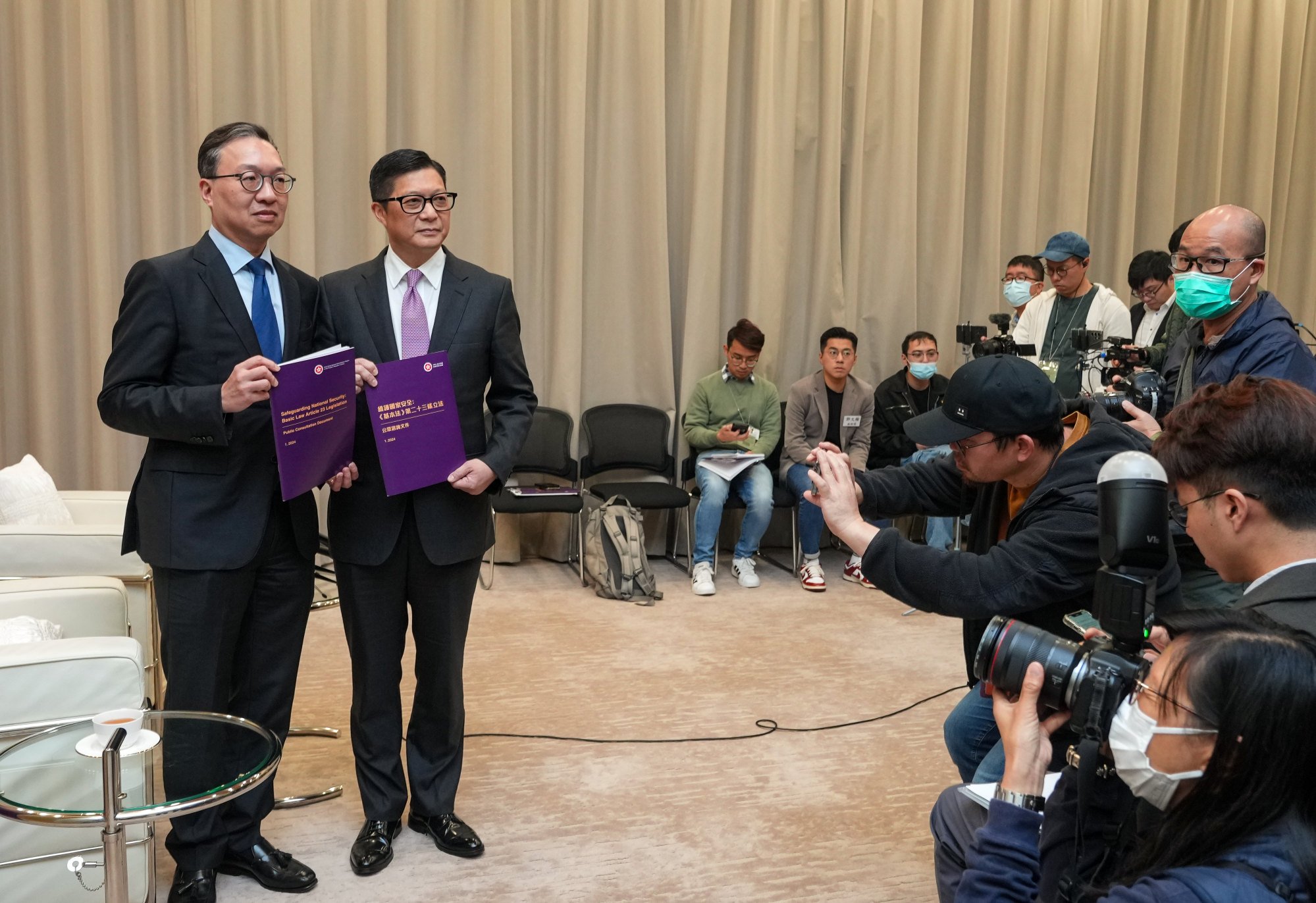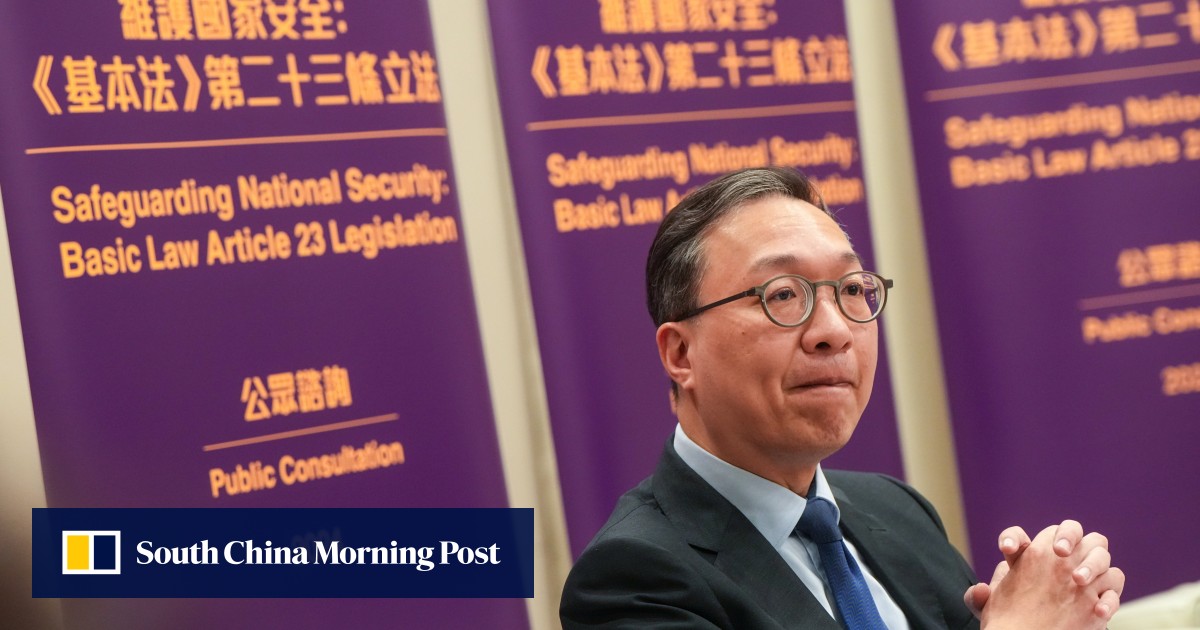“I think no one would dispute that Hong Kong really has a constitutional duty to do it, and we should do it,” Lam said in an interview with the Post and other media outlets, referring to the requirement that Hong Kong enact its own security legislation under Article 23 of the Basic Law, the mini-constitution.
“But when it comes to the contents, as we are now running a consultation about the contents, certainly it’s very normal to have different opinions and they are all very welcome.”
It’s a protective law, not aggressive
He also stressed that it was inaccurate to describe the proposed law as a reporter had done as a way to “crack down” on security threats.
“We want to protect ourselves. We are not attacking others,” he said.
“I always feel we need to characterise [clearly] the entire national security legal regime as being defensive, rather than offensive. It’s a protective law, not aggressive.”
The latest legislation proposes updating existing offences alongside new crimes that are not covered by the Beijing-decreed national security law that came into force in June 2020.
Among the updated sedition legislation, authorities are proposing “the intention to induce hatred or enmity” among residents of Hong Kong or different regions of the country be an offence.
Diplomats, foreign business chambers in Hong Kong ‘worried’ over new security law
Diplomats, foreign business chambers in Hong Kong ‘worried’ over new security law
Former Legislative Council president Jasper Tsang Yok-sing called into question the suggestion, expressing doubts on the wide scope and it not being a matter of a national security threat.
Lam said recent sedition convictions concerned “very extreme speeches” such as those advocating Hong Kong independence and undermining the city’s constitutional order, stressing the government had no intention of curbing residents’ freedom of thinking.
In a bid to reassure the public, he argued that he was not aware of tourists and residents being accused of seditious crimes under the existing law for expressing discontent with the city on social media, such as Xiaohongshu, an Instagram-like platform popular among mainland users.
“We surely welcome free speech on different aspects. Expression of feelings is common in Hong Kong and everyone does it. It is not a target of our [proposed] law,” he said.

Lam, along with the city’s security chief, faced questions on Wednesday from 10 media outlets on different scenarios, especially those related to a suggested public interest defence for state secret offences.
He stressed that he “truly understood” why the questions were raised and pledged to “pay attention” to these concerns during the legislative process.
He also sought to reassure foreign media groups with regard to a proposed espionage offence, which targets the deliberate publication of “a statement of fact that is false or misleading to the public” upon collusion with an external force and with an intent to engender national security.
“Of course, foreign media have different views on Hong Kong, sometimes good and sometimes bad. This is normal. We all talk about other countries the same way, too. I don’t see why [such coverage] will fall into the offence’s scope,” Lam said.
“I’m sure you [reporters] won’t deliberately publish fake news, right?”
No envoys, business chambers oppose Hong Kong national security law: minister
No envoys, business chambers oppose Hong Kong national security law: minister
But Secretary for Security Chris Tang Ping-keung did not rule out that news organisations funded by foreign governments might be considered external forces.
According to the consultation paper on enacting the Article 23 legislation, an “external force” may refer to any government of a foreign country, authority of a region or place of an external territory, an “external political organisation”, as well as its “associated entities and individuals”.
“[Funding] is one of them. Is it under the control, supervision or direction [of an external force]?” Tang said.
“And this is just one of the factors … are you publishing [a false statement] knowingly and are you intending to endanger national security? We surely won’t look at just one factor.”
Tang also maintained that the government’s consultation sessions had managed to allay concerns.
Hong Kong’s Article 23 law likely to state maximum penalties for offences: minister
Hong Kong’s Article 23 law likely to state maximum penalties for offences: minister
“It is reasonable for some people to express concerns before they understand [the proposed legislation]. After our explanations, basically those we contacted have accepted that general business activities would not be affected,” he said.
“Article 23 legislation only affects a very small number of people who want to endanger national security.”
The coming national security law will create a string of new offences. These are: treason; insurrection, incitement to mutiny and disaffection, and acts with seditious intention; sabotage; and foreign interference and theft of state secrets and espionage.
The legislation will sit alongside the Beijing-imposed law, which outlaws secession, subversion, terrorist activities and collusion with foreign forces.

